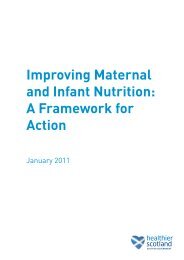Children's Needs â Parenting Capacity - Digital Education Resource ...
Children's Needs â Parenting Capacity - Digital Education Resource ...
Children's Needs â Parenting Capacity - Digital Education Resource ...
Create successful ePaper yourself
Turn your PDF publications into a flip-book with our unique Google optimized e-Paper software.
114 Children’s <strong>Needs</strong> – <strong>Parenting</strong> <strong>Capacity</strong>The relationship between parent and child is usually reciprocal and works in acircular way, each player affecting the response of the other. There are, however somecircumstances where reciprocity is not present; for example although the parentmay be bonded to the child, severe autism or brain damage may result in the babyfailing to attach to the parent (see Aldgate and Jones 2006 for a useful discussion onattachment and children’s development).Possible impact on relationshipsThere are a number of ways in which the relationship between parents and babiesmay be affected. Parents’ behaviour may be inconsistent or disorganised, they maybe emotionally detached or their commitment to their children may be reduced.Mental illness, learning disability, problem alcohol or drug use or the psychologicalconsequences of being a victim of domestic violence can all affect the ability of aparent to maintain consistency, predictability and a physical presence in relation tothe child. In addition, parents with learning disabilities may experience difficultyidentifying and interpreting their baby’s cues (Cleaver and Nicholson 2007).Research suggests that parents who experience these disorders display less aptitudein providing for the baby’s needs for bodily contact and loving care. For example,research has found that many drug-using parents are often emotionally unavailableto their children when using heroin, particularly in the morning when parents feelphysically ill and are worried about securing more drugs for that day (Hogan andHiggins 2001). Mothers who are alcohol dependent and suffer from depressioncan become overwhelmed by their own needs and find it difficult to bond withtheir children, often being disinterested and highly critical of them (Woodcock andSheppard 2002). Domestic violence can lead to maternal stress and depression, andresult in the mother being emotionally distant from her baby. Depression can causemothers to be more disorganised, unhappy, tense and irritable than non-depressedmothers. They may be less effective, show more anger, be less playful with theirinfants and less emotionally available (Field et al. 1990; Reupert and Maybery2007). There is evidence that mothers who remained depressed by 6 months postdeliveryfelt more overwhelmed by the care of their infant and saw their infant asmore difficult (Campbell 1999). When parents have a psychotic illness, attachmentmay be affected because the ill parent is guided by hallucinations which may includethe baby (Cassin 1996). It must, however, be remembered that it is difficult todistinguish the impact of parental disorders from other factors which may influencethe mother/baby relationship such as poverty, unemployment and social deprivation(Marcenko et al. 2000).Maternal insensitivity to the infant’s signals and emotional unavailability are issueskey to the attachment process. This point is reinforced by Murray’s (1992) researchon postnatal depression, which found those infants to be less securely attached totheir mothers than children of well mothers, despite the fact that in most cases thedepression had remitted by 3 or 4 months after the child was born.
















